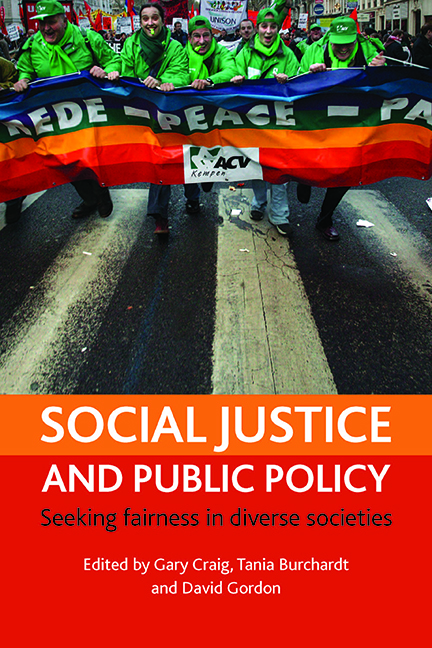Book contents
- Frontmatter
- Dedication
- Contents
- Acknowledgements
- Notes on contributors
- Introduction
- one Social justice and public policy: a view from political philosophy
- two Social justice and public policy: a social policy perspective
- three Multiculturalism, social justice and the welfare state
- four Structural injustice and the politics of difference
- five Recognition and voice: the challenge for social justice
- six Globalisation, social justice and the politics of aid
- seven Social justice and the family
- eight Children, policy and social justice
- nine Social justice in the UK: one route or four?
- ten Monitoring inequality: putting the capability approach to work
- eleven The limits of compromise? Social justice, ‘race’ and multiculturalism
- twelve Understanding environmental justice: making the connection between sustainable development and social justice
eleven - The limits of compromise? Social justice, ‘race’ and multiculturalism
Published online by Cambridge University Press: 19 January 2022
- Frontmatter
- Dedication
- Contents
- Acknowledgements
- Notes on contributors
- Introduction
- one Social justice and public policy: a view from political philosophy
- two Social justice and public policy: a social policy perspective
- three Multiculturalism, social justice and the welfare state
- four Structural injustice and the politics of difference
- five Recognition and voice: the challenge for social justice
- six Globalisation, social justice and the politics of aid
- seven Social justice and the family
- eight Children, policy and social justice
- nine Social justice in the UK: one route or four?
- ten Monitoring inequality: putting the capability approach to work
- eleven The limits of compromise? Social justice, ‘race’ and multiculturalism
- twelve Understanding environmental justice: making the connection between sustainable development and social justice
Summary
The idea of multiculturalism is now widely under attack. A former UK Home Secretary argues that Muslim women should be unveiled when consulting him as an MP as he wishes to see their face. In France, the wearing of the veil and other religious symbols has been forbidden at public schools; and in Canada, the Province of Ontario, having proposed a degree of autonomy to Muslims in the exercise of sharia law, have backtracked on that position under political pressure. The Dutch government has introduced a series of new policies that spell ‘the end of multiculturalism’ (Bader, 2005). In some quarters (see, for example, The Guardian, 29 January 2007) it has even been argued that multiculturalism has been responsible for the creation of suicide bombers.
This wide-ranging attack raises two important issues. One is that we need to recall that most national polities are now multicultural societies (some having been so for hundreds of years), that is, they have within their populations (a generally increasing number of) people whose national origins lie outside their present country of settlement and who bring differing cultural norms to the latter. A growing proportion of these people, however, have been born and bred in these countries of settlement (43% in the case of the UK) with – in theory at least – the same rights as those of their national majority peers. As Parekh (2000a) reminds us, whether people like it or not (and many politicians, most right-wing media and a body of public opinion apparently do not), multicultural societies are a fact of life and cannot be wished away – other than by the violence of ethnic cleansing. This fact of life, however, has yet to translate into truly multiculturalist policy frameworks.
The second, linked, issue is that the increasing number of those who now argue that multiculturalism has failed demonstrate little understanding of what a multiculturalist policy framework is trying to achieve. Currently, debates in the UK (and elsewhere) increasingly wind the clock back to what was known in the 1950s as an assimilationist policy; those immigrating to the UK were expected to leave their cultural baggage behind them as they arrived at the port of entry and become effectively black or brown Britons.
- Type
- Chapter
- Information
- Social Justice and Public PolicySeeking Fairness in Diverse Societies, pp. 231 - 250Publisher: Bristol University PressPrint publication year: 2008



